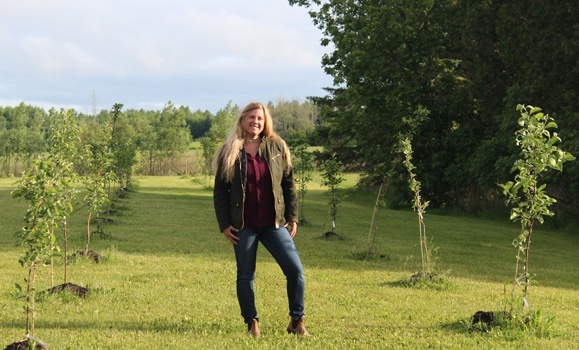
Jun 18, 2020
Passion for organic growing fuels new grower’s farm
Shannon McInnis, a first-generation Canadian, came to gardening and organic agriculture honestly. Growing up outside of Barrie, Ontario, her grandfather, a sugar cane farmer in Barbados, relied on his learned knowledge and thought processes of how to garden organically before it became a mainstream concept.
“I grew up in the country,” says Shannon. “My family owned 10 acres of land, using half an acre for vegetables. My grandfather grew everything you could think of in that small garden. He never used chemicals, or anything unnatural for any of his plants.
“I remember as a child the sheer volume of vegetables, fruits and herbs he would harvest in that garden. He would feed our family of six on fresh vegetables from June to September from that small garden! Everything that was left over, we would preserve through canning and freezing.”
Shannon, one of the first in her family to attend university, has an arts degree in Political Science and her master’s in War Studies but always felt like something was missing.
“I missed my connection to the earth and nature. I found myself constantly growing things. I always had a garden packed with flowers, vegetables, herbs and fruits. I noticed how different food tasted when you grew it yourself. I began to become more mindful of where my food came from and how it was grown.”
Finding her calling
Eventually, Shannon began seeding all her own vegetable cultivars, searching for heirloom and organic breeds that would produce great yield and were sustainable.
“About six years ago, I ended up having almost 40 lbs. in tomatoes from a very small garden. I found myself wondering if this was my natural calling. If this awesome hobby could become a future dream and if my ambition and motivation could help me discover if this could be a business plan for the future?”
Shannon knew if she were to pursue her dream, she needed the right education behind her and applied to Dalhousie for the Certificate of Specialization in Organic Agriculture.
This program provides a head start on a degree and gives learners chance to specialize in the expanding area of organic agriculture. Courses can range from electives to core classes when transferring credits into other programs. There are also opportunities for self-employment on smaller farms that might not be profitable under conventional production.
“Since I am a full-time employee, flexibility is key,” says Shannon. “I don’t have the ability to take live classes consistently. The online platform has always been a great learning tool for me because I am able to take my classes at my own pace and when I have time. There are some days when I will start studying for my course at 4 a.m., so that I can be at work for 8 a.m. I have also found that learning from the comfort of my own home allows me to be more curious and inspired.”
Building her orchard
Shannon and her husband purchased their dream country home just over a year ago and before the kitchen was unpacked, she had planted her first 40 apple trees and a pollinator garden.
“Ivy Orchard was born earlier this year,” explained Shannon. “I found myself in love with this name after recent trips to Scotland and Ireland.”
Of Celtic descent, Shannon wanted her orchard to be about more than growing trees and vegetables but allowing space for a connection to the earth for stability, rooting and health, hand-rearing seedlings and plants, a space for meditation and yoga practices.
“The ancient Celts believed ivy was a symbol of strength and determination along with forming bonds of connections with friends and joy. This spoke to me. I wanted to offer a place that added ‘prana’ or life energy back into what was produced here in the gardens and the orchard. Many of the values found within organic agriculture reflect my personal value system as well. I guess you could say ‘Ivy’ connected all the values that are important to me in one place.”
Shannon’s end goal is to have a highly producing organic orchard. Since beginning the program at Dalhousie, she has gained the confidence to begin the process. Ivy Orchard currently contains 40 apple trees, 10 pear trees, eight elder berry trees, four cherry trees and two peach trees, blueberries, raspberries and blackberries — and she is just getting started.
“While Ivy Orchard is still young, I am relying on the education and research I have done thus far in my program at Dalhousie to help problem solve, conduct research, crop planning and companion planting,” she says. “This was the first year we openly sold over 300 seedlings publicly for donation only to help people connect with their gardens through planting sustainable vegetables. The goal for this year is to sell more vegetables from our over-abundant gardens during the summer months to local visitors.”
The power of online learning
To complete the certificate program, students must choose four of the organic courses from the online offering which includes: Transition to Organic Agriculture, Composting and Compost Use, Principles of Organic Horticulture, Organic Field Crop Management and Organic Livestock Production. Each course may also be taken alone as an elective within a student’s program or as a professional development activity.
“Online courses are a great way to learn in a structured way but on your own schedule,” says Andrew Hammermeister, current director of the Organic Agriculture Centre of Canada. “We have had agricultural professionals, farmers and students from across Canada complete this certificate. The program is a great collaborative effort. We have instructors from three departments and the support of our Extended Learning division working together to deliver the Certificate.”
For more information about the Certificate of Specialization in Organic Agriculture, visit dal.ca/exl or contact extended.learning@dal.ca
Above, Shannon McInnis at Ivy Orchard. Photo: Dalhousie University/Krista Tinsley Doucette






